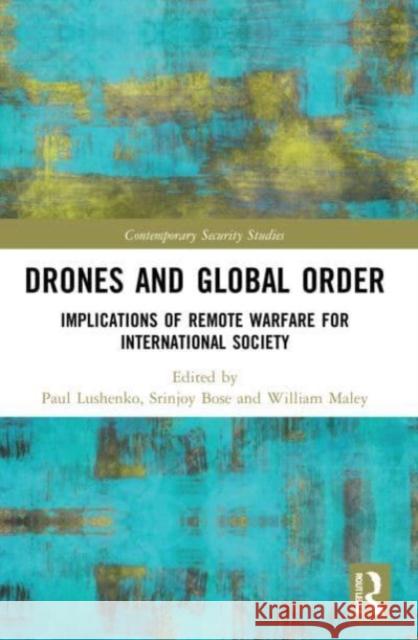Drones and Global Order » książka



Drones and Global Order
ISBN-13: 9780367689261 / Miękka / 2023 / 270 str.
Drones and Global Order
ISBN-13: 9780367689261 / Miękka / 2023 / 270 str.
(netto: 208,57 VAT: 5%)
Najniższa cena z 30 dni: 201,44
ok. 16-18 dni roboczych.
Darmowa dostawa!
This book explores the implications of drone warfare for the legitimacy of global order.
Wydanie ilustrowane
‘Autonomous and remote weapons are the future of warfare, yet until now there has been surprisingly little reflection on their implications for world order. Utilizing international theory and keen insight into contemporary world politics, this impressive volume sheds new light on the system-wide effects of drones on the laws, norms, and practice of warfare, and sets an agenda that others will be obliged to follow.’-
Alex J. Bellamy, The University of Queensland, Australia
'This superb collection of essays significantly advances our understanding of the consequences of drone warfare for global order.'
Stefan Borg, Swedish Defense University, Stockholm
'This book is timely, insightful, and provocative—exactly what is needed to advance the drone warfare debate. The co-editors 'bridge the gap' between academia and the military by including chapters from the world’s leading experts and practitioners of remote warfare. The authors’ insights will help inform decisions of combat leaders across all—tactical, operational, and strategic—levels of war. Students at the War Colleges must read this book to adequately prepare for an era of robotics-enabled warfare.'
Barry McCaffrey, General Retired, U.S. Army, USA
'This important book adds significantly to our understanding of drone warfare in the contemporary era by marrying the contributors’ substantial empirical knowledge with insights drawn from the so-called 'English School' approach to International Relations Theory. This results in a better appreciation of how drone warfare shapes, and is shaped by, the global social order, which English School scholars label international society. Some may consider this hyperbole. However, I also see signs of a change in the evolving phenomenon of drone warfare of perhaps similar magnitude to that of the nuclear revolution at the end of WWII, especially when paired with the related developments in artificial intelligence and cyber warfare. The cumulative effect of these developments may be profound and unsettling for international society, and this book offers a useful platform for thinking through these issues in a more systematic way.'
Laust Schouenborg, University College London, UK
'The editors and contributing authors represent an impressive mix of respected, well-established academics; young scholars entering academia; and practitioner-scholars with deep empirical experience. Each of the thirteen chapters is the product of well-documented, rigorous scholarship.'
Professor Richard Norton, U.S. Naval War College, USA
1. Conceptualizing Global Order in an Era of Remote Warfare Paul Lushenko, Srinjoy Bose, and William Maley Part I: Why do states use drone warfare? 2. Realism, Drone Warfare, and the Future of the International System John Hardy 3. International Society’s Challenge of Targeted Killing by Drones Jodok Troy 4. A Blended Interpretation of Drone Warfare Paul Lushenko 5. Drone Warfare and the Human Protection Transnational Legal Order Cecilia Jacob and Nicola Mathieson Part II: How does drone warfare affect global order? 6. Hierarchy, Drones, and Global Order in International Society John Williams 7. Armed Drones and Sovereignty: The Arc of Strategic Sovereign Possibilities Daniel R. Brunstetter and Amélie Férey 8. Drone Warfare and International Humanitarian Law: The U.S., the I.C.R.C, and the Contest over the Global Legal Order Arturo Jimenez-Bacardi 9. Drone Warfare and the Management of Violence William Maley Part III: How can international society best govern drone warfare? 10. Coming Soon to a Theater (of War) Near You: Drones of all Shapes and Sizes Keith L. Carter 11.The Context and Prospects of Regulating Drones in Conflict Michael P. Kreuzer 12. Suleimani’s Choice: The Narrow Permissions and Wider Considerations of Remote Warfare Robert Underwood Part IV: Conclusion 13. The Significance—and Potential—of a Fourth Wave of Drone Warfare Scholarship John Blaxland, Srinjoy Bose, and Paul Lushenko
Paul Lushenko is a U.S. Army Lieutenant Colonel and General Andrew Jackson Goodpaster Scholar at Cornell University, U.S.A.
Srinjoy Bose is Senior Lecturer in Politics and International Relations at the University of New South Wales, Australia.
William Maley is Emeritus Professor at The Australian National University.
1997-2026 DolnySlask.com Agencja Internetowa
KrainaKsiazek.PL - Księgarnia Internetowa









